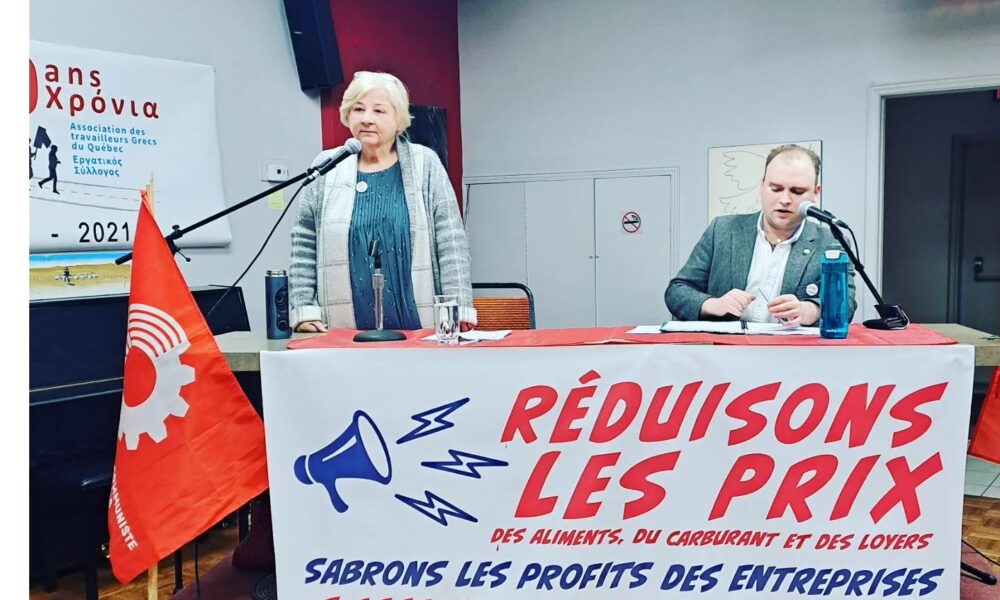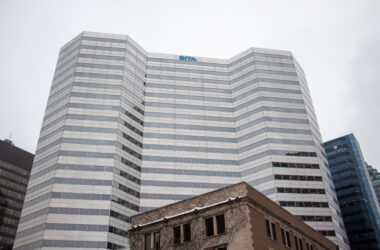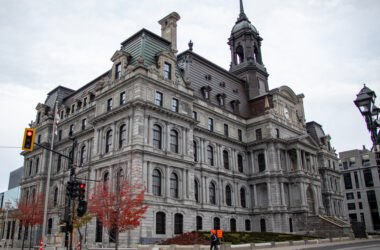On the night of April 1, the Communist Party of Canada (CPC) held a meeting in Montreal to kickstart a campaign against unaffordable living costs at the Greek Workers’ Association of Quebec. Before the meeting, The McGill Tribune sat down with Liz Rowley, leader of the CPC, to learn more about the campaign and its implications for students.
The CPC’s campaign to roll back prices depends on the formation of a coalition between students, trade unions, farmers, and other financially vulnerable groups. Rowley hopes this strategy of mass mobilization will take the form of students and workers joining together to protest, sign petitions, organize public meetings, and pressure their Member of Parliament.
According to Rowley, most of the Communist Party’s newest recruits are under the age of 40. In her opinion, the participation of students in the CPC, and the political engagement of non-voting Canadian youths, shows promise for change.
“I have great hopes that young people today are just as gripped with the notion of the importance of peace, of social justice, of equality, and of socialism, as they were when I was young,” Rowley said. “And that being the case, I have great hopes for […] and confidence in the future [….] Young people and people of conscience can change this picture. I am sure they will.”
Since the age of 17, Rowley has been interested in political activism, social equality, and workers’ rights. Stirred to action by her strong views on the Vietnam War, Rowley joined the CPC in 1967. Today, she is mounting a campaign in pursuit of those goals—more specifically, to lower the cost of food, fuel, and housing, and to raise wages.
In 2022, the cost of food rose by 10.3 per cent, the cost of rent by 12.4 per cent, and the price of gas temporarily reached 207.2 cents per litre in June of that year. Meanwhile, wages relative to labour productivity in the business sector have fallen by an average of three per cent. Rowley blames big corporations for the hikes and believes that only the federal government has the power to curb these trends.
“The government should be raising corporate taxes, which are very low. They should be introducing a windfall profits tax, which the NDP [New Democratic Party] is also calling for,” Rowley explained. “They should be providing tax reductions for working people, [and] we would like to see a progressive tax system where the load is on those most able to pay, which means corporations.”
Unless the government adopts policies to roll back prices and lower taxes—the Goods and Services Tax in particular—Rowley warns that students will see the consequences of government inaction in the form of higher tuition fees, more expensive groceries, and rising costs of off-campus housing.
“I think [McGill students] need to be concerned about student debt,” Rowley said. “And also tuition fees, which are very high, and are going to exclude people who might want to go to university. A lot of students are eating out of food banks.”
Earlier this year, the Tribune reported on the increasing number of McGill students experiencing food insecurity due to the soaring cost of meal plans and on-campus food prices. In some cases, this has led to disordered eating and malnutrition among students.
About 39 per cent of post-secondary students in Canada suffer from food insecurity, often sacrificing meals to pay for tuition, rent, and textbooks. At the same time, the average cost of rent nationwide also surpassed a record-breaking average of $2,000 in 2022.
“Students are worried about […] the question of what [to] do if you have a huge debt when you graduate,” Rowley said. “Can you afford to buy a house, can you decide that you want to marry, can you decide that you want to start a family?”







